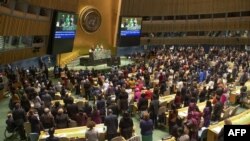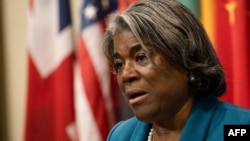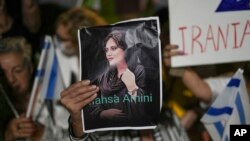The United States called Wednesday for Iran to be removed from the U.N. Commission on the Status of Women (CSW), the main intergovernmental body dedicated to gender equality and the empowerment of women.
“This work is vital. It makes a real difference,” U.S. Ambassador Linda Thomas-Greenfield said of the CSW. “And it deserves our full support, especially when the rights of so many women and girls are under attack. But the commission cannot do its work when it is being undermined from within.”
She said Iran’s membership is an “ugly stain” on the body’s credibility.
“In our view, it cannot stand,” she said.
The U.S. announcement was first made in a statement from Vice President Kamala Harris’s office earlier Wednesday.
Thomas-Greenfield spoke at an informal meeting of Security Council members, known as an Arria meeting, focused on the mass protests that started in Iran on September 16, following the death in police custody of Mahsa Amini, 22. The Kurdish woman was arrested in Tehran by so-called morality police for wearing her headscarf “improperly.”
Police say she had a heart attack in custody, but her family disputes that. The family's request for a committee of independent doctors to investigate her death was rejected by the Iranian authorities.
Independent probe urged
“It is clear that the so-called investigations into the death of Mahsa Amini have failed the minimum requirements of impartiality, independence and transparency,” Javaid Rehman, the U.N. special rapporteur for Iran, told the meeting in a video briefing.
He called for an independent, international investigation into her death – a call that was supported by several council members.
Iran’s ambassador sent a letter on Monday to all U.N. members urging them not to participate in Wednesday’s meeting, saying it violated the U.N. Charter by interfering in Tehran’s internal affairs.
Ahead of the meeting he told reporters that Iranian law enforcement could “manage” any unrest, but that it “would not do so at any cost.”
“The importance of human life and dignity is what ultimately guides our decision,” Amir Saeid Iravani said without taking any questions. “Therefore, the restraint displayed by Iranian law enforcement should not be [seen as] a sign of weakness.”
The regime has been widely criticized for its use of disproportionate force against peaceful protesters. The special rapporteur said at least 277 people, including 40 children, have been killed by security forces in the demonstrations. Thousands more have been arrested.
“Make no mistake about it, the Islamic Republic [of Iran] is a totalitarian system that uses forced confessions and torture to stifle all dissent,” actor and activist Nazanin Boniadi told council members.
She said the future of the country can “only be written by its own people on its own streets” and urged international support.
“The international community should want what the courageous demonstrators in Iran want,” Boniadi said. “It’s time for us to stop abetting the Islamic Republic and support the freedom-loving people of Iran.”
Albania co-sponsored the meeting with the United States.
Iran police 'ignited a fire'
“The Iran morality police wanted to make an example. They ignited a fire,” Albanian Ambassador Ferit Hoxha said of Amini’s arrest. He said now the genie of freedom is out of the bottle.
Nobel Peace Prize laureate and Iranian human rights lawyer Shireen Ebadi said the people will no longer settle for anything less than a democratic and secular government.
“Many young people in Iran were killed for freedom and democracy,” she said by video. “Don’t let the Islamic Republic impose more grief on people’s lives. We’d be grateful for your standing on the right side of history.”
The U.N. Economic and Social Council is the body that elects members to the Commission on the Status of Women. Thomas-Greenfield told reporters after the meeting that she would work with other countries in the coming days and weeks about how to proceed on seeking Iran’s removal.






